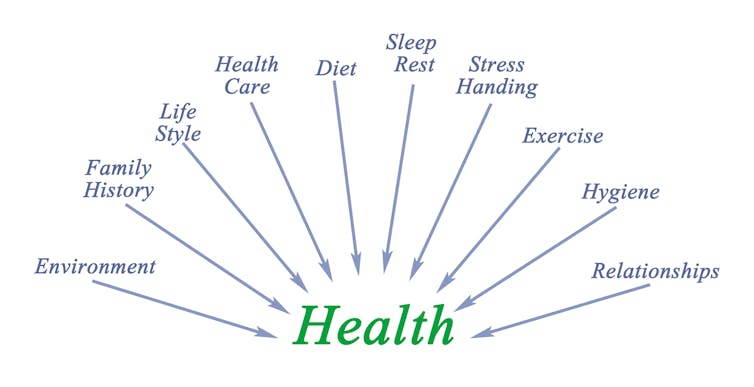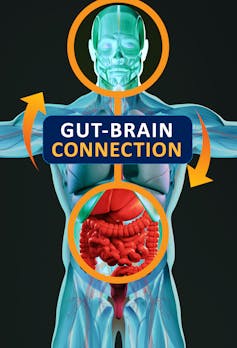The key to our humanity isn't genetic, it's microbial
- Written by Ian Myles, Head, Epithelial Therapeutics Unit, National Institute of Allergy and Infectious Diseases
What if the key to perfecting the human species were actually … yogurt?
The fantasy of trying to perfect humanity through genetics was recently reignited by the announcement of the Chinese scientist claiming[1] to have made the first “CRISPR babies,” which were named for the technique used to edit the DNA of the embryos. While major ethical and regulatory concerns[2] are present, fears that CRISPR will lead us into the dystopian world depicted in the movie “Gattaca”[3] are unfounded. In fact, if the movie were remade today it would likely be a story about the government mandating probiotics and healthy eating.
 Probiotic or yogurt drink filled with billions of beneficial bacteria.
HstrongART/Shutterstock.com[4]
Probiotic or yogurt drink filled with billions of beneficial bacteria.
HstrongART/Shutterstock.com[4]
Eugenics[5] is the belief that humanity can be perfected through genetic manipulation. Past eugenic policies placed restrictions on marriage and immigration, justified slavery and forced sterilizations, and ultimately culminated in the Holocaust. I am a physician-scientist specializing in allergies who became interested in eugenics not in relation to skin color, but skin rashes. Most prominent researchers who study a a skin rash called eczema were convinced that the vast majority of the disease is determined by fixed genetic sequences[6]. Many still are. However, just like the studies of intelligence and criminal behavior that came before it, research into the genetics of eczema[7] has fallen well short of what the 15th-century techniques had predicted.
To be fair, the public’s fascination with this subject is understandable. Commercial breaks are filled with pseudoscientific claims that your DNA can reveal, for example, that you are 12.4 percent Italian, 3.1 percent Neanderthal, and 1/512th Native American. Spoiler alert: It can’t[8]. Prominent magazines[9], podcasts[10] and newspapers[11] have pushed the debunked claim that intelligence is genetically encoded. In reality, genetic studies that were supposed to explain at least 80 percent of being a genius have explained only 5 percent[12]. This means your genes, at best, have less impact on your IQ score than a good night’s sleep[13]. However, modern misunderstanding of how complex traits are passed down isn’t just burdening society with hucksters and racists. Ignorance is causing us to overlook opportunities for improving health and treating disease.
Where did ideas like a ‘gene for IQ’ come from?
 Researchers conducting twin studies assumed that common behavior and trait was a result of common genes, not a common environment.
natthawut ngoensanthia/Shutterstock.com[14]
Researchers conducting twin studies assumed that common behavior and trait was a result of common genes, not a common environment.
natthawut ngoensanthia/Shutterstock.com[14]
Most of the ideas of “genes for” complex traits come from twin studies that assumed that identical twins and fraternal twins would differ only by the amount of shared DNA. What twin researchers either didn’t realize, or willfully ignored, is that the influence of the environment is also stronger for identical twins. Because identical twins are more likely to be dressed alike and confused for one another, they form more of a shared identity[15].
Thus, identical twins are more likely to share the same hobbies, eat the same foods, and run in the same social circles than fraternal twins. Modern research shows these differences are more psychology than biology. Furthermore, since identical twins share the same embryonic sac in the womb, their environmental exposures are also more biologically similar[16] than fraternal twins. As such, researchers claiming that twin study data is indicative of genetics are, at best, ill-informed.
What is the modern understanding of heritable traits?
It may seem counterintuitive, but just because one change can worsen a gene’s function, that doesn’t mean that a different change can enhance it. When scientists say a gene “contributes to intelligence” they are referring to situations in which mutations in the gene cause a loss of intelligence or delay in cognitive development. They are not implying that a special version of the gene can guarantee a college degree.
Enhancing the functions of genes is most often accomplished via epigenetic modifications[17] – chemical tags that are attached to the DNA but do not alter the genetic code. If genes are words, sentences and paragraphs, then epigenetics[18] is the cadence, emphasis and diction. This is akin to having Hamlet performed by Gilbert Gottfried versus Benedict Cumberbatch. While epigenetic changes can be passed on from parents to children, they can also be altered by stress[19], diet, environment[20] and behavior[21]. Therefore, I believe that environmental modification, not CRISPR, would be needed to enhance the vast majority of genetic functions.
 There are a lot more factors than genes that influence good health.
arka38/Shutterstock.com[22]
There are a lot more factors than genes that influence good health.
arka38/Shutterstock.com[22]
Another way to inherit traits
A more recently appreciated influencer of heritable traits is the microbiome, the term for all of the microorganisms (bacteria, fungi and viruses) that peacefully co-exist with humans.
From a genetic standpoint, your human genes are probably outnumbered[23] over 100 to 1 by microbial genes. Modern research suggests that the microbiome may be directly involved in diseases ranging from autism to obesity[24]. The microbial influence can be passed[25] from mother to child during and possibly before[26] birth, but remains partially sensitive to diet[27] and environment[28] into adulthood.
 Gut microbes are known to play a role in mental health.
Anatomy Insider/Shutterstock.com[29]
Gut microbes are known to play a role in mental health.
Anatomy Insider/Shutterstock.com[29]
The microbiome can even influence your epigenetics. Researchers are just beginning to tap into the potential of microbial treatments for diseases. Similar to our lab’s experimental treatment for eczema[30], live bacterial therapies for food allergies[31], depression and anxiety, heart disease and select cancers[32] are in development. As scientists clarify which strains of microbes are most helpful, these treatments are expected to become even more powerful.
Think of it this way: The current and former U.S. presidents share 99.9 percent[33] of their genetic sequence, despite being slightly more than 0.1 percent different. As such, modern scientists do not hide from eugenics-based ideas because they are controversial; they dismiss them because both “Gattaca”[34] and The Bell Curve[35] are to genetics what Flat Earthers are to astrophysics.
While properly conducted gene therapy[36] does offer real hope for curing rare genetic diseases, its limitations stop well short of sci-fi. As just one example, feeding mice one specific type of bacteria[37] significantly enhanced their memory, whereas genomics has failed to find any genes that could do the same. Ancestry charlatans and neo-eugenicists may deny the fact that people are more a product of their experiences than their genetic heritage, but perhaps their mothers just didn’t breastfeed them[38] long enough.
References
- ^ Chinese scientist claiming (theconversation.com)
- ^ ethical and regulatory concerns (theconversation.com)
- ^ “Gattaca” (www.imdb.com)
- ^ HstrongART/Shutterstock.com (www.shutterstock.com)
- ^ Eugenics (theconversation.com)
- ^ fixed genetic sequences (www.ncbi.nlm.nih.gov)
- ^ genetics of eczema (www.ncbi.nlm.nih.gov)
- ^ It can’t (theconversation.com)
- ^ magazines (nymag.com)
- ^ podcasts (samharris.org)
- ^ newspapers (www.nytimes.com)
- ^ only 5 percent (doi.org)
- ^ good night’s sleep (doi.org)
- ^ natthawut ngoensanthia/Shutterstock.com (www.shutterstock.com)
- ^ shared identity (www.madinamerica.com)
- ^ more biologically similar (doi.org)
- ^ epigenetic modifications (doi.org)
- ^ epigenetics (www.whatisepigenetics.com)
- ^ stress (theconversation.com)
- ^ diet, environment (theconversation.com)
- ^ behavior (well.blogs.nytimes.com)
- ^ arka38/Shutterstock.com (www.shutterstock.com)
- ^ probably outnumbered (doi.org)
- ^ autism to obesity (learn.genetics.utah.edu)
- ^ can be passed (doi.org)
- ^ possibly before (doi.org)
- ^ diet (doi.org)
- ^ environment (doi.org)
- ^ Anatomy Insider/Shutterstock.com (www.shutterstock.com)
- ^ experimental treatment for eczema (theconversation.com)
- ^ food allergies (doi.org)
- ^ depression and anxiety, heart disease and select cancers (doi.org)
- ^ share 99.9 percent (www.genome.gov)
- ^ “Gattaca” (www.imdb.com)
- ^ The Bell Curve (www.vox.com)
- ^ gene therapy (ghr.nlm.nih.gov)
- ^ one specific type of bacteria (dx.doi.org)
- ^ breastfeed them (www.thelancet.com)
Authors: Ian Myles, Head, Epithelial Therapeutics Unit, National Institute of Allergy and Infectious Diseases
Read more http://theconversation.com/the-key-to-our-humanity-isnt-genetic-its-microbial-108320

